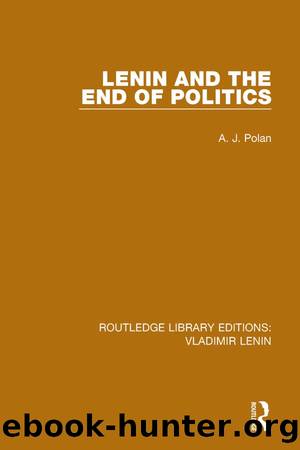Lenin and the End of Politics by A. J. Polan

Author:A. J. Polan [Polan, A. J.]
Language: eng
Format: epub
Tags: History, Russia & the Former Soviet Union, Modern, 20th Century, General
ISBN: 9781351794275
Google: IRS9DgAAQBAJ
Publisher: Routledge
Published: 2017-04-21T01:28:11+00:00
THE PARTY PROBLEM
It is common in critiques of the Soviet state to attribute its deficiencies to the authoritarian structure of the Bolshevik party from its earliest pre-revolutionary days. Its intolerance, its exclusivity, its hierarchical structure, its concentration of effective power at the top can all be detected in the Soviet Union not long after the seizure of power. This apparent similarity suggests a process of organic growth as the authoritarian party creates the authoritarian state. My argument would not seek to deny this, but rather to relegate it to a subordinate status as an explanatory schema. A concentration on the responsibility of the party allows the responsibility of the constitution to escape unexamined. Indeed, the absence of the party from the pages of The State and Revolution had provided an argument for the innocence of that text, by implying to its ideas a viability and practicality that was simply corrupted or abolished by the democratic centralist organization. In contrast, I would suggest that the regrettable features of the Bolshevik party were not a world apart from features that all political parties tend to display; the fact that these features came to define the lineaments of the Russian state, whereas elsewhere they appear to have been kept under control, is due to Leninâs concept of state form, not his concept of party.
The Leninist party is accused of two ominous qualities. Internally, it has an excessively rigid and centralist character, denoted by the term âdemocratic centralismâ; and in its relations with the external political world, it claims a status of privilege over other political tendencies inasmuch as its politics claim to be âscientificâ. The consequences of both these assumptions may then be identified in the subsequent authoritarian regime.
Essentially, democratic centralism was intended âto make the local organisations the principle organisational units of the Party in fact and not merely in name, and to see to it that all the higher-standing bodies are elected, accountable, and subject to recallâ.56 In this it differs hardly at all from the manner in which the internal life of political parties is normally organized except in one respect. The differentia specifica of democratic centralism lay in its definition of conditions under which no democratic norms would be allowed to prevail:
In the heat of the battle, when the proletarian army is straining every nerve, no criticism whatever can be permitted in its ranks. But before the call for action is issued, there should be the broadest and freest discussion and appraisal of the resolution, of its arguments and its various propositions.57
The question acutely posed is therefore, who shall issue the âcall for actionâ which will terminate discussion? Who is to decide what shall constitute such an âactionâ and for how long shall its authority be deemed to have sway? Lenin proposed the simple answer: the party congress, the highest and most representative authority of the party. But if the âactionâ situation ever came to prevail over a number of years, as it quite publicly did in the desperate
Download
This site does not store any files on its server. We only index and link to content provided by other sites. Please contact the content providers to delete copyright contents if any and email us, we'll remove relevant links or contents immediately.
| Africa | Americas |
| Arctic & Antarctica | Asia |
| Australia & Oceania | Europe |
| Middle East | Russia |
| United States | World |
| Ancient Civilizations | Military |
| Historical Study & Educational Resources |
Red Famine: Stalin's War on Ukraine by Anne Applebaum(2928)
Midnight in Chernobyl by Adam Higginbotham(2541)
Chernobyl by Serhii Plokhy(2534)
Midnight in Chernobyl: The Untold Story of the World's Greatest Nuclear Disaster by Adam Higginbotham(2220)
Red Shambhala by Andrei Znamenski(2193)
The House of Government by Slezkine Yuri(2191)
The Gulag Archipelago (Vintage Classics) by Aleksandr Solzhenitsyn(2096)
Red Notice by Bill Browder(2070)
All the Kremlin's Men by Mikhail Zygar(2064)
From Cold War to Hot Peace by Michael McFaul(2029)
Putin's Labyrinth(2016)
From Russia with Lunch by David Smiedt(1971)
The Future Is History by Masha Gessen(1904)
A People's Tragedy by Orlando Figes(1864)
The Romanovs by Simon Sebag Montefiore(1820)
How to Tame a Fox (and Build a Dog): Visionary Scientists and a Siberian Tale of Jump-Started Evolution by Lee Alan Dugatkin & Lyudmila Trut(1760)
The Lost Spy by Andrew Meier(1745)
Putin's Labyrinth: Spies, Murder, and the Dark Heart of the New Russia(1741)
Art and Revolution by John Berger(1721)
